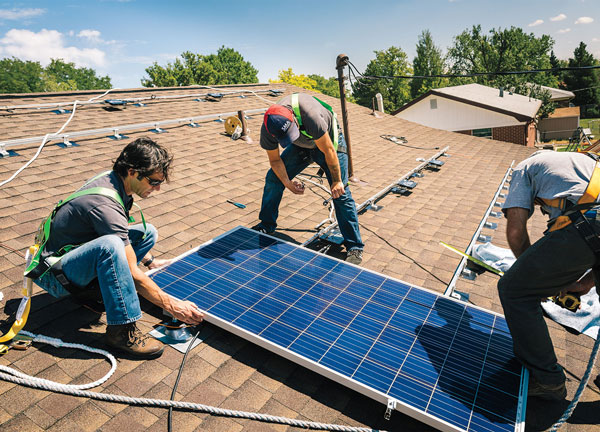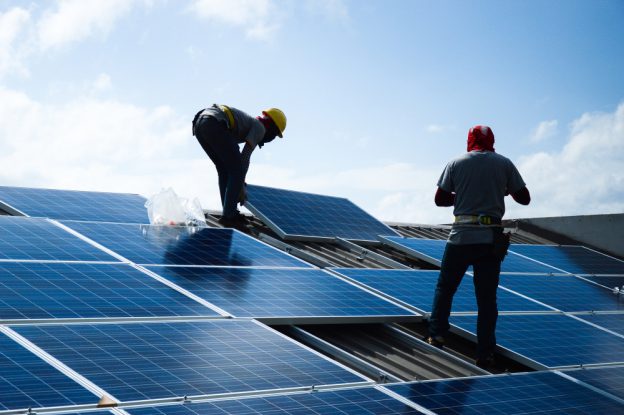Solar Power Installation for Businesses: Why You Should Install Solar Panels in Fort Lauderdale
Solar Power Installation for Businesses: Why You Should Install Solar Panels in Fort Lauderdale
Blog Article
Just How to Select the Right Solar Power Setup for Your Energy Needs
Picking a suitable solar power installation calls for a methodical approach that begins with a clear understanding of your energy intake patterns and expected future needs. Variables such as the kind of solar modern technology, setup costs, and offered motivations play crucial functions in making an informed choice.
Assess Your Power Demands
Examining your energy requires is an essential initial step in the solar power installment process. Recognizing your current and future power consumption will certainly guide the design of an effective planetary system tailored to your demands. Beginning by analyzing your energy costs from the past year to establish your typical regular monthly power use, usually gauged in kilowatt-hours (kWh) This data will offer a structure for calculating the dimension of the solar system you might require.
Consider seasonal variations in power intake, as particular months might demand even more power due to heating or cooling requirements. In addition, assess any type of organized adjustments in way of living or building, such as the purchase of electric cars or home growths, which may increase your power needs in the future.
As soon as you have a thorough understanding of your power intake, you can determine the ideal solar ability needed to fulfill those demands. This evaluation not only helps in sizing the solar setup yet additionally educates choices about power storage services and prospective grid connection needs. solar photovoltaic. Inevitably, properly evaluating your energy requires guarantees that your solar power system runs successfully, supplying the benefits of renewable resource in alignment with your intake patterns

Evaluate Solar Modern Technology Options
When taking into consideration a solar energy setup, it is essential to evaluate the various solar technology alternatives readily available to guarantee the system aligns with your power demands and spending plan. The primary innovations include monocrystalline, polycrystalline, and thin-film solar panels, each offering distinct benefits and downsides.
Monocrystalline panels are known for their high performance and efficiency in limited area, making them ideal for domestic installments with less roofing system location. Thin-film solar panels are light-weight and flexible, suitable for unusual surface areas, yet they usually have reduced efficiency and require more space to create the very same power outcome.
In addition to panel types, think about solar inverters, which transform the straight existing created by the panels right into rotating existing for home use. String inverters, microinverters, and power optimizers each have distinct advantages that can influence system efficiency. Evaluating these options will assist you make an enlightened decision that satisfies your power demands properly.
Think About Installation Costs
Understanding installation costs is essential for anyone considering a solar power system. These prices can differ dramatically based on numerous variables, consisting of system dimension, kind of panels, and setup intricacy. A regular household solar installment might range from $15,000 to $30,000 prior to incentives, which can be a substantial upfront financial investment.
To properly assess setup costs, it is important to obtain thorough quotes from multiple solar carriers. These quotes ought to damage down the expenses of devices, labor, allows, and any kind of extra accessories needed for the setup. Pay close interest to the top quality of products being offered, as higher-quality panels and inverters can cause much better efficiency and durability, potentially offsetting greater initial prices.
Furthermore, think about the long-term effects of setup prices. A less costly installment might conserve money in advance but could lead to greater upkeep expenses or lowered energy manufacturing in time. It is additionally recommended to review financing alternatives, such as solar car loans or leases, which can influence your overall monetary dedication.
Study Citizen Rewards
Checking out regional incentives can substantially affect the general cost of a solar energy installment. Lots of areas supply a range of financial incentives focused on advertising sustainable energy use, making solar power more easily accessible and economical for property owners and businesses alike.
These motivations may consist of government tax credit ratings, state discounts, and regional energy business programs that supply cash money rewards or internet metering choices. The Federal Investment Tax Credit Report (ITC) enables you to deduct a significant percentage of your solar setup prices from your federal tax obligations. State-specific rewards can better enhance these cost savings, often in the type of straight money discounts or tax credit scores.
Additionally, some city governments might provide real estate tax exemptions for solar setups, making certain that your financial investment does not raise your residential or commercial property tax obligation. Investigating these rewards can uncover substantial cost savings, view it which can influence your decision on the size and kind of planetary system to set up.

Pick a Reliable Installer
Picking a respectable installer is critical to ensuring the success and long life of your solar energy system. The installment procedure significantly impacts the performance and efficiency of your solar panels, making it vital to select a specialist with a tried and tested performance history. Begin by investigating neighborhood installers via on-line testimonials and endorsements. Internet sites such as the Bbb can give insight into consumer fulfillment and solution integrity.
Next, verify the installer's click to read qualifications, including licenses, click here for more certifications, and insurance policy. A trustworthy installer must hold certifications from recognized organizations, such as the North American Board of Qualified Energy Practitioners (NABCEP), showing a high level of expertise. In addition, ask about the installer's experience with similar jobs, particularly in your area, as neighborhood environment and guidelines can influence setup techniques.
Request numerous quotes and compare them not just on rate however additionally on the quality of devices and warranties provided. A trustworthy installer should supply clear information regarding their services and products, aiding you make an educated choice. By investing time in choosing a reputable installer, you will improve the general performance and durability of your solar power system.
Final Thought
Finally, selecting the suitable solar power installment demands an extensive examination of power needs, an understanding of available solar innovations, and a careful consideration of setup expenses. Checking out neighborhood motivations can boost monetary benefits, while selecting a credible installer makes certain top quality handiwork and integrity. solar photovoltaic. By systematically analyzing these factors, people can attain an optimum solar option that satisfies both present and future power needs, eventually adding to sustainable power techniques and expense financial savings with time
Report this page